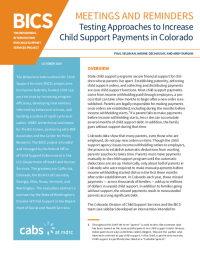Meetings and Reminders
Testing Approaches to Increase Child Support Payments in Colorado

State child support programs secure financial support for children whose parents live apart. Establishing paternity, enforcing child support orders, and collecting and distributing payments are core child support functions. Most child support payments come from income withholding paid through employers, a process that can take a few months to begin after a new order is established. Parents are legally responsible for making payments once orders are established, including during the months before income withholding starts. If a parent fails to make payments before income withholding starts, he or she can accumulate several months of child support debt. In addition, the family goes without support during that time.
Colorado data show that many parents, even those who are employed, do not pay new orders on time. Though the child support agency issues income withholding orders to employers, the process to establish automatic deductions from working parents’ paychecks takes time. Parents must make payments manually to the child support program until the automatic deductions are set up. Historically, only about half of parents in Colorado who were required to make manual payments before income withholding started did so in the first three months after order establishment. In Colorado each year, these missed payments — across thousands of families — add up to millions of dollars in unpaid child support. In addition to families going without support, the missed payments result in noncustodial parents accruing significant debt.
The Colorado Division of Child Support Services and the Behavioral Interventions for Child Support Services (BICS) team developed an intervention intended to increase payment amounts and the number of parents who made payments during the first months after orders were established. The intervention aimed to reach parents without income withholding orders and parents whose income withholding orders were still processing. For parents without income withholding orders, the intervention was predicted to help them develop a habit of making regular payments on their own.
The intervention was implemented in four counties: first in Denver and Garfield Counties, then six months later in Arapahoe and El Paso Counties. In each county, parents with new orders were randomly assigned to either a control group or an intervention group.
Parents in the control group received business-as-usual services. Intervention group parents attended a short meeting with a caseworker in which they went over specially designed materials related to making child support payments. These materials emphasized the consequences of not paying and helped the parent make a concrete payment plan. For three months following the meeting, parents received monthly payment reminders using the method they preferred (text message, phone, or email), and caseworkers monitored their cases, calling nonpayers after they missed their payments. The intervention was implemented in two settings: in Administrative Process Action (APA) conferences (described below) and after court hearings that resulted in order establishment.
Overall, the findings show that the intervention succeeded in increasing payments by an average of $115 (19.9 percent) over the first three months after order establishment. This increase was the result of positive effects among the subgroups of parents whose orders were established in APA conferences and parents with income withholding orders. Among parents whose orders were set in court (roughly 24 percent of the full sample), the intervention led to an unanticipated reduction in payments, though that reduction was not statistically significant (so it may have occurred by chance rather than as a result of the intervention).






